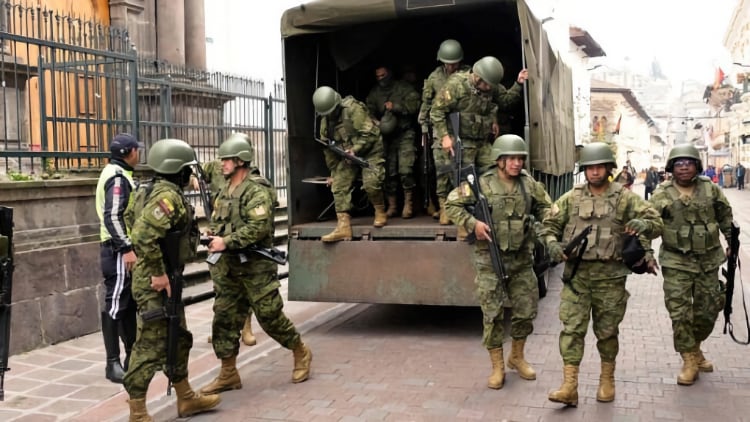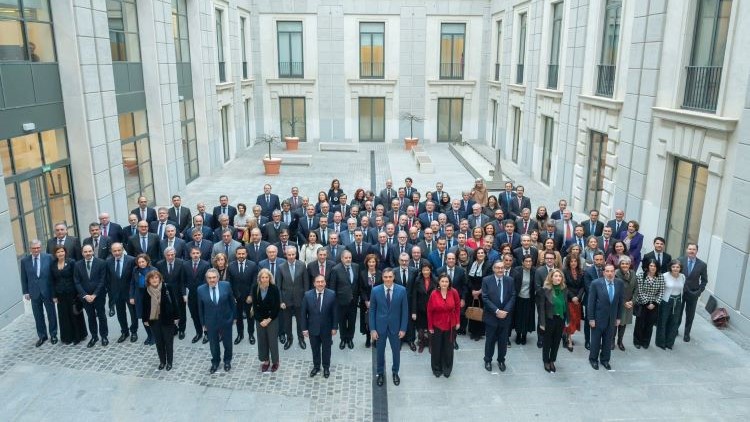Luis Ayllón/Eduardo González
The Government of Spain yesterday condemned the violent acts committed by criminal groups in Ecuador and expressed its support for Ecuadorian democratic institutions to restore normality.
During the inauguration of the VIII Conference of Ambassadors, held at the headquarters of the Ministry of Foreign Affairs, the President of the Government, Pedro Sánchez, conveyed to the Ecuadorian people that Spain is following the events with concern and expressed its support for democratic institutions and its confidence that “normality will soon be restored.” At the same event, the Minister of Foreign Affairs, José Manuel Albares, expressed “his solidarity and support for democratic institutions.”
For its part, the Spanish Embassy in Quito condemned, through its X social network account, “the violent acts of recent days committed by criminal groups” and expressed its solidarity “with the victims.” “We support the democratic institutions of Ecuador to restore normality in the lives of the brother Ecuadorian people,” it continued.
In diplomatic media consulted by The Diplomat, in this reaction from the Spanish Government was missing express suport for the president of Ecuador, Daniel Noboa, who has declared the existence of an internal conflict in the country and has given full powers to the Armed Forces to act against the groups of criminals who have carried out the violent acts of recent days.
The express support for Noboa does appear in the messages launched on social networks by the leaders of the Popular Party. Thus, the president of that party, Alberto Núñez Feijóo, stated: “Ecuador is experiencing critical moments that we from the PP continue with concern. “I want to convey to the Ecuadorian people and their president, Daniel Noboa, all our support and my wish that order is restored soon.”
The president of the Community of Madrid, Isabel Díaz Ayuso, spoke in similar terms, writing: “All our support to the people of #Ecuador and its president, Daniel Noboa, in these terrible moments for the country.” So did Fernando López Miras, president of Murcia, a community with a large population of Ecuadorians, indicating. “All our support to the people of Ecuador, to its president, Daniel Noboa, and to the Ecuadorian community that resides in the Region of Murcia, in the face of the critical situation that the country is experiencing.”
Outside our country, the secretary general of the Organization of American States (OAS), Luis Almagro, wrote: “We convey our support for the provisional emergency measures taken by President Daniel Noboa. The fight against organized crime and delinquency within the framework of citizen rights is fundamental in the region. Control of detention centers by State security forces is essential. Ecuador can count on the work of the General Secretariat of the OAS in its efforts for security in the country.”
For its part, the Ibero-American General Secretariat “strongly” condemned the acts of violence perpetrated by organized crime groups and expressed its “support and solidarity to the Ecuadorian government and people, wishing for the speedy recovery of peace and public order.”
From the European Union, the High Representative of Foreign Policy, Josep Borrell, stated: “Deeply concerned about the serious uptick in violence in Ecuador orchestrated by criminal groups. It is a direct attack on democracy and the rule of law. The EU will continue to support the people of Ecuador and its democratic institutions and stands in solidarity with the victims.”
For a few days now, Ecuador has been facing an outbreak of violence and insecurity led by “narcoterrorist” organized crime, with kidnappings, explosions and prisoner escapes. At least ten people have died, including two National Police officers.
Given this situation, and the establishment of the state of emergency in Ecuador for 60 days and the declaration of a situation of internal conflict, the Spanish Ministry of Foreign Affairs yesterday updated the travel recommendations to that country, advising that they be limited to those “essential”.
Furthermore, Spaniards in Ecuador are urged to closely follow the decisions and recommendations of local authorities and to follow the social networks of the Spanish Embassy in Ecuador (@EmbEspEcuador) and the Consulates General in Quito (ConsEspQuito) and Guayaquil ( ConsEspGuayaquil).
Currently, there are about 65,000 Spaniards registered in the Consulates (34,154 in Quito and 29,352 in Guayaquil) and, according to diplomatic sources consulted mid-afternoon yesterday, all of them were fine.
According to information provided by the Ministry of Foreign Affairs, the situation at airports is evolving rapidly: Quito’s international airport is operational, but access to it has been restricted to travelers only and security measures have been reinforced. Additionally, a growing number of airlines are canceling flights to/from Quito. A similar situation occurs at the Guayaquil airport.
In different parts of the country – adds the Ministry in a note prepared late on Tuesday afternoon – security incidents are multiplying (looting, kidnappings, assaults on television stations, attacks against the police) increasing the already high level crime existing to date. It is recalled that, according to official figures, more than 7,800 homicides have been recorded in Ecuador in 2023, which places the rate at around 45 homicides per 100,000 inhabitants.
The president of Ecuador, the conservative Daniel Noboa, plans to come to Spain at the end of January to attend the Madrid International Tourism Fair (Fitur), where Ecuador appears as a Fitur 2024 Partner Country, although this trip is conditional on the improvement of the situation in the country.
If the trip takes place, Noboa will be received by the King and the President of the Government, he will visit Fitur and participate in a business meeting at the CEOE headquarters, scheduled for January 25.
At the end of October and beginning of November, the then president-elect of Ecuador was already in Spain, where the King offered him a lunch, met with businessmen, organized by Ceapi, and received the International Medal of the Community of Madrid. Don Felipe later attended, on November 23, the inauguration of Noboa, the youngest president in the history of Ecuador, at 35 years old. As happened more recently with the inauguration of the new president of Argentina, Javier Milei, the Government did not send any minister to accompany the King at the event.
The Ibero-American community has its sights set on Ecuador also because it is planned that in November of this year, the XXIX Ibero-American Summit will be held in that country, specifically, in the city of Cuenca, something that would be very difficult to carry out, if the same climate of violence remains.






